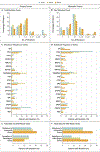Racial Differences in Genomic Profiling of Prostate Cancer
- PMID: 32905685
- PMCID: PMC8971922
- DOI: 10.1056/NEJMc2000069
Racial Differences in Genomic Profiling of Prostate Cancer
Figures

References
-
- Mahal BA, Alshalalfa M, Spratt DE, et al. Prostate cancer genomic-risk differences between African-American and white men across Gleason scores. Eur Urol 2019;75:1038–40. - PubMed
Publication types
MeSH terms
Grants and funding
LinkOut - more resources
Full Text Sources
Medical
